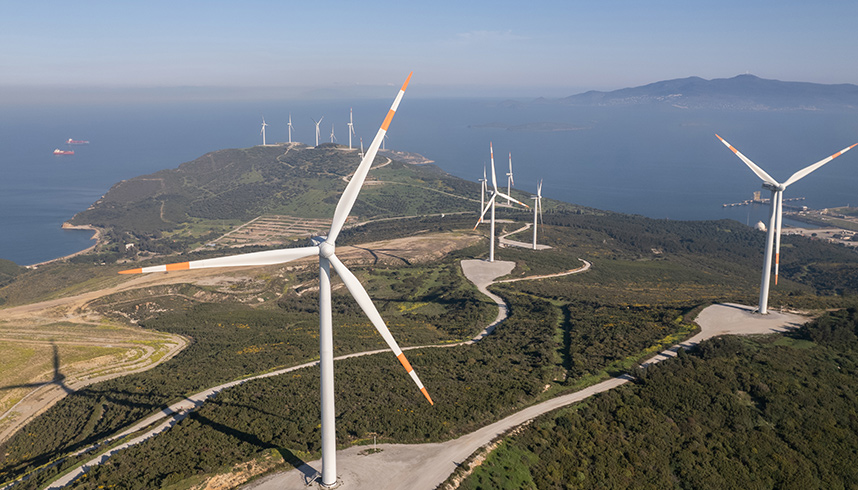
What is an Ecological Footprint? What ecological studies are carried out by SOCAR Türkiye?
As long as we exist, all the activities we carry out have a cost to nature. The impact of this cost on nature and the extent to which biological capacity is exceeded are calculated by the ecological footprint. Reducing the ecological footprint is vital on the road to a sustainable future. So what is an ecological footprint? How is it calculated? What do we, as Socar Türkiye, do about this? Let's take a look at the answers.
What is an Ecological Footprint?
Just like the footprints we leave when we walk, the ecological footprint reflects the environmental impact of our activities. This sustainability indicator, developed in the mid-1990s, represents demands on the ecosystem and natural resources. In other words, it shows how the lifestyle and consumption habits of individuals or communities influence nature. It is also important for understanding and evaluating sustainability goals such as preserving biodiversity, reducing carbon emissions and using natural resources in a sustainable way.
The primary factor comprising the ecological footprint is carbon, which is why it is frequently mistaken for the carbon footprint. Despite their interconnection, these two concepts actually address different issues. The carbon footprint refers to the carbon emissions resulting from our activities. The ecological footprint calculates how much of this will be cleansed by the forests.
How to calculate the ecological footprint?
The ecological footprint shows how far the planet's biological capacity has been exceeded. So that's how much the world can provide for our needs. This calculation is important for a sustainable future.
Biological capacity refers to an ecosystem's ability to regenerate its natural resources and manage the ecological pressure caused by human activities. Therefore, it demonstrates the balance between the rate of resource utilization and the speed of natural regeneration. When biological capacity is equal to or greater than the ecological footprint, it means that organisms can continue to thrive. Consequently, the primary objective within the context of the ecological footprint is to reduce its proportion. Low biological capacity indicates that natural resources are becoming inadequate.
The following formula is used to calculate the ecological footprint:
Ecological footprint = Consumption x Production area x Population
The ecological footprint can be calculated both individually and collectively for individuals and communities. A person who adopts a sustainable lifestyle and goes to work by bicycle has a lower ecological footprint than a person who transports himself by private vehicle. Similarly, companies that invest in renewable energy and green technologies also have a lower ecological footprint than those that use fossil-fuel-based energy.
“A person who adopts a sustainable lifestyle and goes to work by bicycle has a lower ecological footprint than a person who transports himself by private vehicle.”
The ecological footprint comprises elements including the carbon footprint, agricultural land footprint, forest footprint, pasture footprint, built-up area footprint, and fishing area footprint. Carbon generated by the combustion of fossil fuels accounts for more than half of the ecological footprint.
How can the ecological footprint be reduced?
Understanding the ecological footprint is crucial for sustainability because as the world's population increases, natural resources continue to deplete. We are at risk of our ecological footprint exceeding our planetary boundaries in the near future. Therefore, it is essential that we reassess our personal lifestyles and social habits and take measures toward a more environmentally friendly and sustainable future.
How do we reduce our ecological footprint in SOCAR Türkiye?
As SOCAR Türkiye, we are dedicated to preserving biodiversity and natural resources by minimizing our environmental impact. Guided by the Sustainable Development Goals, we are at the forefront of the low-carbon energy transition. As part of our decarbonization strategy, we aim to achieve a 40% reduction in emissions by 2035 and reach net-zero emissions by 2050.
As SOCAR Türkiye, our goal is to minimize the greenhouse gas emissions that naturally occur. To achieve this objective, we have two primary areas of emphasis: decreasing energy consumption and maximizing the use of alternative energy sources to meet our energy requirements. Our continuous efforts in energy efficiency and digitalization-focused value creation, which are centrally managed under the My Value Platform, stand out in this field.
Throughout 2022, we remained committed to carrying out initiatives within the 'My Value Platform' that influence sustainability, production expansion, and capacity utilization. Our 56 projects, which contribute positively to sustainability, resulted in substantial savings for the year 2022: 29,000 MW of electricity, 17,000 tons of natural gas, 16,000 tons of fuel gas, and 108,000 tons of water.

With the Green Meter project initiated by SOCAR Türkiye, we measure and report carbon emissions at the source and facility levels. We monitor the carbon emissions of a total of 22 consumption points, such as our headquarters buildings and storage facilities powered by green energy, through the SOCAR Green Meter Portal.
As part of our sustainability approach, our focus is on creating positive impacts for individuals, communities, and the environment. Our objective, in line with ISO 14064 standards, is to effectively control our carbon footprint by delivering monthly reports through the Green Meter project. We are committed to strategizing, overseeing, and attaining pre-established objectives for carbon footprint reduction via facility-specific source reporting. Thanks to the Green Meter project, which covers our facilities in all the cities in which we operate as SOCAR Türkiye, we can produce monthly and annual, location-based, facility-based and resource-based reporting.
Blue Climate Ambassadors Project
We believe that individuals and institutions should play an active role in the fight against environmental problems. In this direction, we have joined the Blue Climate Ambassadors Project with the DenizTemiz Association/TURMEPA, which aims at empowering women in the maritime sector, raising awareness in the fight against climate change, and protecting the seas and biodiversity. We have trained all our colleagues to raise awareness in this area. We have sought to contribute to sustainable climate, clean seas, zero waste with institutional solutions through the process. We also collected approximately 1.1 tons of waste from the coast cleaning in the project. We are working today for a better tomorrow, fueled by our energy.